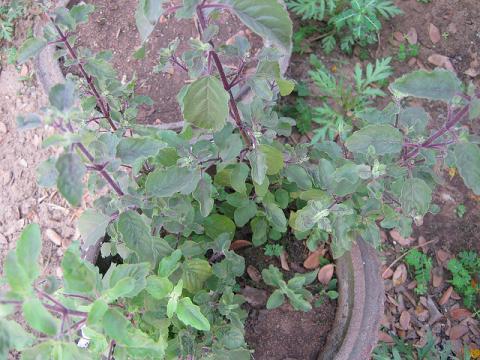
In the south of India the temples are colored and decorated with stories from ancient Indian texts and scriptures. The spires reach up to the sky in a cartoonish display, making the western mind feel like it's in make-believe land. And it's true, that the rules of life are different in India. The collective consciousness of the country holds very different views and contrasting beliefs to what the west holds as “truth.” Therefore, reality is literally different as well. For in India, especially in the south, Tulsi plants (also known as Holy Basil) sit on every window sill and in every temple, believed to be a protector and a blessing to every inhabitant and visitor. In Ayurvedic medicine, born in India, Tulsi is regarded as the Queen of all herbs, so magical and beneficial is it.
I had seen the plant in windows and on ledges during my travels, though not paying it much mind. So many other sensations and colors, challenging sensory experiences, and mind-bending concepts and interactions had kept me from questioning the significance of the small and often thin stalks of green (and sometimes purple) herb placed in the front of every home. It wasn't until I stood in a painted Vishnu temple in Tamil Nadu that I made my first acquaintance with the Tulsi plant.
The interior was dark and cold, built from stone, and had an ancient feel to it. Not so different from most of the other temples I had visited during my adventures and travels through the land – temples dedicated to Shiva, Durga, Kali and Brahma, though this temple complex was extremely huge – reaching over 150 acres. It was the first time I had been in a temple dedicated to Lord Vishnu, “the sustainer” and “the preserver” - as he is known in India – part of the 3 main aspects of the One consciousness (Brahma, Shiva & Vishnu) – of the Hindu Trinity.
As I walked into the temple, I was greeted with a smile and a handful of small green leaves mixed with tiny cubes of sugar. “Tulsi” the man said. “For Vishnu,” he added, while smiling the sweetest grin.
I ate the leaves and a smile too came over my face. The peace that pervaded this temple was palpable. After meeting with the carvings in the inner sanctums I followed some stairs upward. They led all the way to a vast, open rooftop where I was afforded a view of the entire complex, it seemed, and the town surrounding. The colors and the daylight hit me like a dream. I fell to my knees. Literally. The pervading peace there dropped me down into humble reception. Tulsi and Vishnu were having their way with me and it was transcendent.
I had been told many stories of the Hindu pantheism while traveling through India. Many of the aspects of the Divine had truly spoken to me – Shiva, Kali, Durga, Brahma. I had visited their temples and had personal experiences with them that allowed me to feel I “understood” what they taught, represented and could offer me as I came into alignment with them. Vishnu, however, had eluded me until that moment. But there on the rooftop of an ancient temple dedicated to Lord Vishnu, I met his essence through the Spirit of the Tulsi plant...and Peace and Healing did abide.
There is a reason every Indian home is decorated with a Tulsi plant outside. Just its presence alone offers extreme benefits, medicinally and spiritually. Scientific studies have proven Tulsi to be effective in guarding against every major bacteria and virus, even the aroma alone. It is both a disinfectant and a germicide. Dedicated Indian believers will honor their Tulsi twice per day, lighting a candle and giving thanks for the protection and blessings of Lord Vishnu, for whom the plant is said to represent, or be “consort of” and be prized by.
In Ayurvedic medicine, Tulsi is the “Queen of all herbs” as it is known to be one of the most powerful and adaptive herbs – applicable and morphable to almost any condition – just like a proper queen. For fevers, it is thought magical. In lung conditions including bronchitis, asthma, colds and congestion, Tulsi knows no parallel. It has even been known to heal the damaging effects of smoking. However, to truly understand the scope of Tulsi's benefits, it is crucial to look at the vast array of conditions and issues it has been used for with astonishing results, including:
- Cancer
- Stress-reduction
- Kidney stones
- Oral care
- Mosquito deterrent/Malaria
- Skin care
- Sinus care
- Immune health
- Headaches
- Anti-fungal
- High blood pressure
- Anti-aging tonic
- HIV inhibitor
- Anti-protozoa
- Eye care
- Protects and heals from poisoning
- Lessens labor pains
- Digestive health
- Anti-worm/parasite
- Wound healer
- Adaptogen
- Diabetes
- Anti-acne
- Hormone balance
- Vitamin K source
- Anti-inflammatory
- Natural Glaucoma treatment
- And the list goes on and on
Tulsi is Queen of herbs because you can use the entire plant -- stems, root, leaves, flower, seeds and all...and for basically any ailment, so diverse are its uses. Also known as “Holy Basil,” Tulsi is held sacred in both the Hindu religion and within the ancient system of Ayurvedic medicine. In both systems, which are mutually supportive, this herb is prized above all others, and touted as an essential part of a dietary system for promoting and sustaining excellent health and well-being, including psychological and spiritual health.
I left Tamil Nadu that trip with a tender spot in my heart which will always remain for Lord Vishnu and his beloved Tulsi. The experience I had was profound. India is full of profundities. Though it has been some time since returning to the Motherland, I will not let too much time pass between cups of Tulsi tea, often blended with other herbs such as rose, jasmine, peppermint, ginseng and cacao. The taste of Tulsi on its own, however, is amazingly delicious and soothing.
As a spiritual companion and gentle reminder to surrender into peace, into love and into that which sustains all – Tulsi is the Queen. It is a superb replacement for daily coffee as a longevity and health support which will bring peace into your home and strength into your heart. For the immune system and energy systems of the body, there is no equal. For Tulsi truly is the Queen of Ayurvedic herbs and her queendom is the multi-layered, multidimensional body/mind. Go forth and enjoy some Tulsi today, and feel the peace.
Om Shanti
Photo Credit: "Tulsi" by Mani Bhaskar is licensed under CC BY 2.0
References:
https://www.organicfacts.net/health-benefits/herbs-and-spices/health-ben...
http://food.ndtv.com/food-drinks/18-benefits-of-tulsi-facts-you-must-kno...








